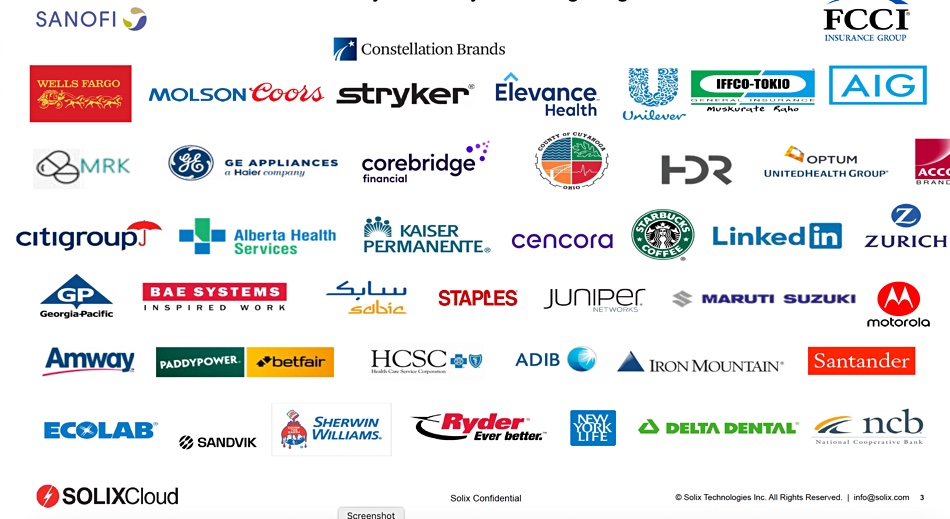Profile. Solix, the enterprise information archiving survivor, says it’s working on privately trained AI assistants to help customers converse with their active and archived enterprise app data.
The company was founded 22 years ago by CEO Sai Gundavelli to connect with enterprise applications such as ERP, CRM, and mainframes. It is application-aware and ingests, creates, and stores metadata about their information documents in a Common Data Platform. A set of applications are built on this platform.

The Solix software ingests older documents and data from these applications’ primary storage and archives it to lower-cost stores such as public cloud object instances. Its hundreds of customers are typically global Fortune 2000 companies and include Wells Fargo Bank, Elevance Health, Sterling Pharmaceutical, LG Electronics, Helen of Troy, and Korea Telecom, with a preponderance for the banking, insurance, and pharmaceutical markets.

We met Solix on an IT Press Tour in Santa Clara and Gundavelli said revenue had grown 50 percent from 2022 to 2023 to the $20-30 million region, and that the privately-owned company is profitable. It is developing LLMs it says are capable of being trained on a customer’s private data to improve accuracy.
B&F has been writing about the overall storage market for 20 years or more and has not come across Solix before, which prompts us to take a look at the reasons for this.
We think Solix does its info archiving top down, from the enterprise app viewpoint, not bottom-up from the storage arrays level. B&F looks at the storage market from the storage angle and that means we have had a blindspot for higher-level suppliers such as Solix. We categorize suppliers such as Komprise and Datadobi, also latterly Hammerspace and Arcitecta, as information lifecycle management operators. They are, we can say, storage array and filer-aware, and ingest data and metadata from storage, both hardware-defined and software-defined.
They do not ingest data directly from JD Edwards or SAP HANA or enterprise applications like that. Solix does, and operates at a higher level, as it were, in the enterprise information and storage stack than the more storage-focused operators such as Komprise, Datadobi, Hammerspace, and Arcitecta.
We checked this point of view with Sai Gundavelli, and he said: “I agree on your assessment why B&F never encountered us. Take for example:
- Komprise – Unstructured Data Only
- Datadobi – Unstructured Data Only
- Hammerspace – Unstructured Data Only
- MediaFlux – Never encountered them, but they claim all types of data
“Yes, we are working with application folks, not the storage folks. We work across structured, unstructured, and semi-structured, we have 186 connectors, starting from mainframe, DB2, Sybase, Informix, VAX/VMS. The most complex thing we manage for enterprises is structured data, which is key for SAP HANA, Snowflake, Databricks, and data warehousing and AI.
“Let’s take Cohesity or Druva, they are clearly in a category of backup and recovery. You clearly have an argument for online backup and making the data available for AI. You are correct on that, but we haven’t seen that yet. Most enterprises operate with each division making their own decision for either traditional tape backup or online, they are disparate. First, globally all backups in an enterprise need to be online. Secondly, all data to be enriched with metadata. Thirdly, it also has to provide governance and compliance globally. Further, it has to connect to machine learning algorithms, and one needs to train the algorithms as well. All these things are possible, but it is all about execution.
“Take Citibank, AIG, Kaiser Permanente, Pepsi – not that they are not doing backup and not that they may have Cohesity. We have not seen them to improve application performance nor manage compliance from a data retention or data sovereignty perspective etc.
“Irrespective, enterprises want to embrace AI. Whoever can help them achieve faster are the winners. We believe having access and understanding of all enterprise data is key, provides competitive advantage to bring AI to enterprises. For example, just imagine an AI algorithm which can predict cancer. How do you knit the data, with compliance and governance considerations, an element of structured data querying from Epicor or Cerner or AllScripts, and also bringing in unstructured medical imaging provide as an API and ensure Canada data is processed in Canada only and US data in US only? See which of the companies can enable it. Solix can do that.”








